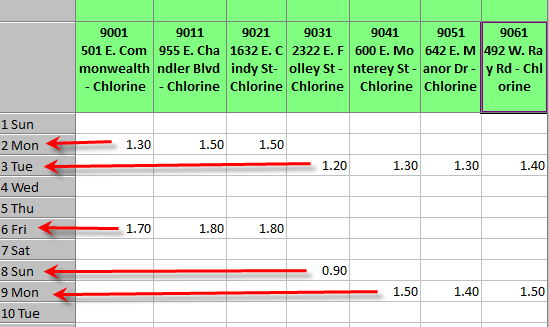MVUDWO returns the Xth Unique Date (where X is set by Offset) from a series of values.
SYNTAX:
MVUDWO(Offset, DateFormat, VarNum1, VarNum2, ...,VarNum99)
MVUDWO(Offset, DateFormat, "Where Clause")
where :
Offset sets which date to return, (i.e., 1st date, 2nd date, etc...)
DateFormat is the Format for the date to return. Common Formats:
"mm/dd/yyyy" Returns: 08/15/2008
"mm/dd/yy HH:MM" Returns: 08/15/2008 10:45
VarNum1, VarNum2,...,VarNum99 is a comma separated list of variables that sets which variable to search.
"Where clause" : Instead of providing a list of variables, you can use an SQL WHERE clause against the VarDesc/Location tables to get the list of variables. (i.e., "Units = 'mg/L'" would return all variables with Units set to mg/L. NOTE: In order to refer to the Location table you MUST specify the table name (i.e. LOCATION.LVL2_ID). See examples.
NOTES:
All variables listed MUST have the same frequency (i.e., daily, hourly, ...).
EXAMPLES:
Input Data: Data for these variables occurs on the 2nd, 3rd, 6th, 8th, and 9th.

Example Functions and their results:
=MVUDWO(1,"mm/dd/yyyy",9001,9011,9021,9031,9041,9051,9061)
=MVUDWO(1,"mm/dd/yyyy","VARNUM > 9000 AND NAME LIKE '%CHLORINE'")
=MVUDWO(1,"Short Date","NAME LIKE '%Chlorine' AND LOCATION.PARENTID=33")
Hint: Use Location Setup to find Locations Ids (ParentID, LVL2_ID, etc...)

SEE ALSO: MVVNWO, MVDWO ,DWO, V, VT